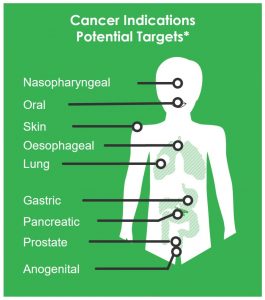Invion is partnering with world leading research institutes to develop novel photosensitisers based on the Photosoft Technology that will improve the treatment of skin cancers and hard-to-treat solid cancers. These new compounds aim to be more effective at targeting and killing cancers without harmful side effects and minimal discomfort.

Find out more about Invion’s cancer program by clicking on the sections below:
Invion is currently undertaking a Phase I/II non-melanoma skin cancer (NMSC) trial using a topical formulation of its lead drug candidate, INV043. The Company is using an adaptive trial design, which will give it increased flexibility in running the trial.
As a result of the adaptive design, this clinical trial may go beyond a typical Phase I trial as the trial results will not only include safety data but may also include exploratory efficacy signals. Invion also has the ability to close the trial early if exploratory efficacy endpoints are met, which will allow the Company to advance quickly down the clinical development pathway.

On the basis of pre-clinical studies conducted to date, it is expected that the reaction of visible light and oxygen with the Photosoft gel will kill the cancer cells on the patient’s skin, leaving surrounding cells unharmed.
Further, Invion has taken the approach of using INV043 manufactured under Good Manufacturing Practice (GMP) in the formulation of the topical ointment, which is a higher quality level than is typically required for Australian Phase I trials.
Click here for more details.
Invion released promising results from a Phase II prostate cancer trial undertaken in Melbourne using a sublingual formulation of lead drug candidate, INV043.
The Phase II prostate cancer trial used six treatment cycles of INV043 as a monotherapy. It was found to be safe and well tolerated by patients with no serious adverse events experienced and all side effects reported were mild.

In terms of efficacy signals, 40% of patients showed a positive response to the treatment with 10% demonstrating complete regression as measured by the Response Evaluation Criteria in Solid Tumours (RECIST) 1.1 framework – a standard way to measure the response of a tumour to treatment.
Further, 44% of patients had negative Prostate Specific Membrane Antigen – Positron Emission Tomography (PSMA-PET) results three months post treatment (all patients were positive before the treatment).
Click here for details.
Invion is developing a treatment for ano-genital cancers and the U.S. FDA has granted Orphan Drug Designation to INV043 for the treatment of anal cancer.
Invion has signed a research agreement with world-renowned research organisation, Peter MacCallum Cancer Centre (known as “Peter Mac”).
Under the agreement, Peter Mac will undertake pre-clinical and in vitro and in vivo studies on Invion’s Photodynamic therapy for ano-genital cancers, including penile and anal cancer. Penile and anal cancers are usually diagnosed late as patients are often reluctant to seek medical advice until their condition worsens. This means many cancer sufferers miss the potential benefit of early intervention and instead have to endure painful and high-risk treatments. Subject to the outcomes, the laboratory studies undertaken at Peter Mac will pave the way for clinical studies to be undertaken with IVX-PDT.
Invion signed a collaboration agreement with a major South Korean pharmaceutical group, Hanlim Pharma Co., Ltd. (Hanlim), to develop a treatment of glioblastoma multiforme (GBM), which is a primary brain malignancy with a poor prognosis.
Under the agreement, Hanlim will fund Proof-of-Concept in vitro and/or in vivo studies at Seoul St. Mary’s Hospital (SSMH) to demonstrate INV043’s diagnostic potential and therapeutic efficacy for GBM. Invion retains all rights to the Photosoft technology and any new IP resulting from the partnership.
GBM is the most common primary brain tumour in adults accounting for 45.2% of malignant primary brain and central nervous system tumours. GBM remains a challenging disease with a
median survival of 15 months and only 5.5 % of patients survived five years post-diagnosis.
SSMH is regarded as one of the top five hospitals in South Korea and among the most prestigious in the country.
Invion is currently positioning the company for future use and development of IVX-PDT in lung cancer PDT treatments.
As such, Invion recently appointed lung cancer consultant Assoc. Prof Louis Irving to the Company’s Scientific Advisory Board. Invion is planning to expand its operations to include intravenous applications of its PDT treatment for lung cancer.

Invion’s completed in vitro trials with leading Australian researchers from the Hudson Institute of Medical Research for its IVX-PDT compound to treat multiple ovarian cancer cell lines.
The treatment aims to address a known gap in current treatment options for ovarian cancers, which have a five-year mortality rate greater than 70 per cent. Also, ovarian cancer patients almost universally develop recurrent, chemo-resistant disease.
Researchers compared the efficacy of four photosensitisers used in PhotoDynamic Therapy, including Photosoft Oral and an improved formulation of PhotosoftTM technology called IVX-PDT, in in vitro tests against ovarian cancer cells.
Dr Andrew Stephens, Research Group Head Ovarian Cancer Biomarkers at Hudson Institute explains why there’s an urgent need for new treatments to treat ovarian cancer


